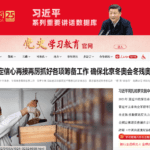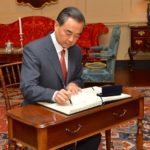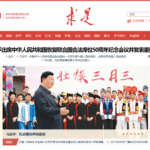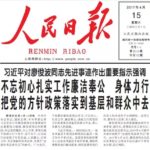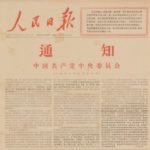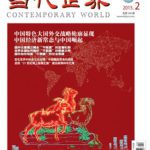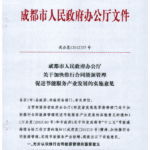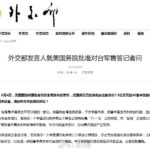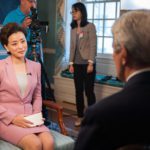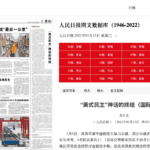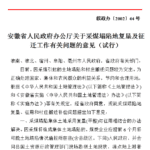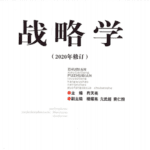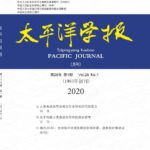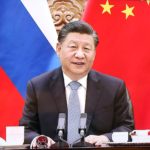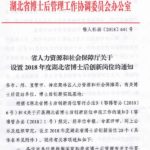Library
| Title | Published | Uploaded | Source | Author | Media Type | Category | Tags | Related Analysis |
|---|
|
At the 21st collective study session of the CCP Politburo, Xi Jinping stressed the need for advancing the comprehensive and strict governance of the Party by starting with improving work style, and further implement the requirements of the Party's self-revolution in the new era
习近平在中共中央政治局第二十一次集体学习时强调 坚持从抓作风入手推进全面从严治党 把新时代党的自我革命要求进一步落实到位
The CCP Politburo holds “collective study sessions” on a semi-regular basis, in which an outside academic or government expert leads a discussion on a selected topic. Such sessions can signal which issues the senior leadership considers to be important. The 21st collective study session of the 20th Central Committee Politburo was held on June 30, 2025, and was presided over by Xi Jinping. Xi delivered a speech emphasizing the need to continue the self-revolution of the Party by further regulating the exercise of power and enforcing strict discipline. |
Political Bureau of the CCP Central Committee 中共中央政治局 | |||||||
|
Special Action Plan to Boost Consumption
提振消费专项行动方案
This special action plan issued by the Chinese Communist Party and the State Council outlines 30 actions to boost domestic consumption. These proposals aim to spur and improve the quality of consumption capacity, service consumption, and more to enhance the contributions of domestic consumption to China’s overall economy. The plan prioritizes increasing consumer spending power through pay adjustments and direct employment support while also addressing constraints on consumption. It also calls for leveraging fiscal policy support to supplement public services and expand disposable income, increasing consumption efficiency, and promoting new industries, consumption models and income channels. |
General Office of the Central Committee 中共中央办公厅, State Council 中华人民共和国国务院 | |||||||
|
At the 20th collective study session of the CCP Politburo, Xi Jinping stressed the need for self-reliance and self-improvement, highlight application-oriented approaches, and promote the healthy and orderly development of artificial intelligence
习近平在中共中央政治局第二十次集体学习时强调 坚持自立自强 突出应用导向 推动人工智能健康有序发展
The CCP Politburo holds “collective study sessions” on a semi-regular basis, in which an outside academic or government expert leads a discussion on a selected topic. Such sessions can signal which issues the senior leadership considers to be important. The 20th collective study session of the 20th Central Committee Politburo was held on April 25, 2025, and was presided over by Xi Jinping. Xi delivered a speech emphasizing the need for the party to promote innovation in the field of artificial intelligence, while also enhancing self-reliance and striving to set global standards. |
Political Bureau of the CCP Central Committee 中共中央政治局 | |||||||
|
Xi Jinping Emphasizes Unwavering Implementation of the Holistic Approach to National Security, Advancing the Peaceful China Initiative to a Higher Level at the 19th CCP Politburo Collective Study Session
习近平在中共中央政治局第十九次集体学习时强调 坚定不移贯彻总体国家安全观 把平安中国建设推向更高水平
The CCP Politburo holds “collective study sessions” on a semi-regular basis, in which an outside academic or government expert leads a discussion on a selected topic. Such sessions can signal which issues the senior leadership considers to be important. The 19th collective study session of the 20th Central Committee Politburo was held on February 28, 2025 and was presided over by Xi Jinping. Xi delivered a speech emphasizing the need to shift China’s public safety governance model from “reactive response” to “proactive prevention,” which entails expanding community-based security forces, and resolving various conflicts at the local level. |
Political Bureau of the CCP Central Committee 中共中央政治局 | |||||||
|
Decoding the Impact of External Demand under the Tariff Storm
解码关税风暴下的外需冲击
Days after Trump’s “Liberation Day” tariffs announcement, Guan Tao, the global chief economist at BOCI China, assesses the impacts of the intensifying U.S.-China trade war. He compares this round of tariffs with the earlier tariffs imposed during Trump’s first term, concluding that their impacts on China this year may be similar to those of 2019. However, Guan views the external environment as increasingly suppressive and unpredictable, arguing that it will force China to “focus on doing its own things well” and spur domestic reforms spanning its development pattern, trade model, and macroeconomic policy priorities. Guan expects U.S.-China economic and trade relations to worsen but is confident these domestic adjustments will enable China to weather the “tariff storm.” |
Guan Tao 管涛 | |||||||
|
The Impact of the New Trump Administration's Policies on China's Economy and Trade
新一届特朗普政府施政主张对我国经贸的影响
Three Chinese state-affiliated researchers Jiang Zhao, Dong Chao, and Fu Jiang assess the impact of Trump 2.0 on the global economy and U.S.-China trade relations. They foresee Trump’s policies as harmful to multilateral economic cooperation, but they believe the impact on China will be limited. They also propose a slate of countermeasures for Beijing, which include further diversifying export markets and trade cooperation with emerging economies, optimizing China’s ability to attract foreign investment, accelerating RMB internationalization, and “telling China’s economic development story well” to influence global public opinion. |
Dong Chao 董超, Fu Jiang 付江, Jiang Zhao 姜照 | |||||||
|
Deepening Cross-Military Reform
深化跨军地改革
Commentator Zhong Xin’s analysis of PLA reform situates national defense within the overall framework of economic and social development. The piece argues that China needs to continue building an integrated national strategy system, especially focusing on defense-industrial production and S&T upgrading. |
Zhong Xin 钟新 | |||||||
|
Eradicate the Breeding Ground and Conditions for Corruption
着力铲除腐败滋生的土壤和条件
Zhang Fuhai, a member of the Central Committee for Discipline Inspection, provides an overview of the Party-state’s recent anti-corruption work and outlines strategies to continue countering graft. Emphasizing that the Party has won an “overwhelming victory” against corruption under Xi Jinping’s leadership, Zhang suggests that the next steps will be implementing systemic dis-incentives, maintaining high pressures against misconduct, strengthening investigations, and cultivating a culture of integrity. |
Zhang Fuhai 张福海 | |||||||
|
On China's High-level Opening Up to the Outside in the Context of Major Changes Unseen in a Century
论百年未有之大变局下的中国高水平对外开放
Yang Guoliang, a professor at the University of International Business and Economics (UIBE) in Beijing, frames U.S. pursuit of strategic competition with China as a reemergence of Western imperialism. He suggests the relative shift in economic power away from the West in past decades, toward the rest of the world, has led Washington to characterize globalization as “out-of-control” and introduce its own set of restrictions on international commercial engagement. While reiterating the need for continued reform and opening up, he underscores the need for China to set its own limits on commercial openness — particularly in the realm of inbound foreign investment from the West — in order to safeguard its sovereignty, security and development interests. |
Yang Guoliang 杨国亮 | |||||||
|
Analysis of the Impact of Trump’s Return on China’s Trade
特朗普回归对中国贸易冲击辨析
In the wake of Donald Trump’s victory in the 2024 U.S. presidential election, a top economist at the Bank of China Securities unpacks the potential trade impacts of a second Trump administration on China. He argues that Trump 2.0 may not be universally unfavorable from Beijing’s perspective, given he is entering his second term more focused on domestic issues and China currently maintains a lower trade deficit with the United States than other countries. Though he suggests Trump 2.0 could be less volatile than Trump 1.0, Guan cautions that Beijing still needs to prepare for U.S.-China trade relations to worsen and views domestic reforms and economic performance improvements as key to strengthening China’s position. |
Guan Tao 管涛 |
